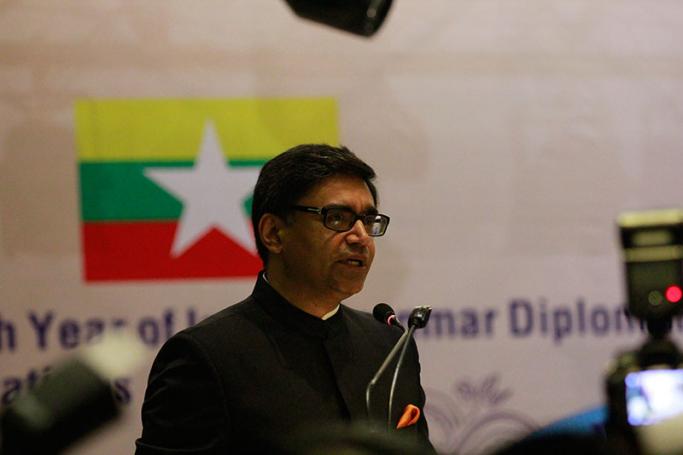India wants to help Myanmar build a strong physical infrastructure for growth focused on creating public assets for the country rather than commercial assets for its own business, Indian ambassador Vikram Misri told Mizzima in an exclusive interview on Thursday.
"We don’t want to do what some other countries are doing, we want to create public assets for Myanmar to use, not the commercial infrastructure to primarily promote our business," Misri said in an interview to put the perspective on the visit of Prime Minister Narendra Modi on Sept 6-7.
“The point is that the assets we are creating are public assets, belonging to the people and government of Myanmar,” he said. “They don’t belong to commercial interests from India.”
Most of the development projects supported by India are financed by grants and some by aconcessional line of credit. "But the idea is not to create for Myanmar a financially unsustainable debt burden; our projects are to help Myanmar economy bloom."
The ambassador said the first two phases of the Kaladan Multi Modal project were now ready, the port and inland waterways infrastructure.
"Work will soon start on the 109-km road connecting Paletwa river terminal to Zorinpui on Myanmar's border with Mizoram state in northeast India. The construction is expected to start after the monsoon in October. The contract has been awarded," Misri said.
Ambassador Misri said Modi's visit would focus on "our strong civilisational linkages" and project the great diversity of Myanmar's culture.
The ambassador said India was offering and would offer more support to Myanmar during its transition to democracy, "as we have the most relevant experiences to offer in nation-building, federalism, democratic participation and so much more."
Misri said two groups of legislators had visited India in delegations to gather hands-on experience on our vibrant democracy. Now the Speaker of the Myanmar Lower House has also decided to visit India at the invitation of the Indian Lok Sabha speaker, he said.
"While the first group of MPs were from national parties, the second group was from ethnic regions, they went to Mizoram where India ended a bloody 20-year-long ethnic insurgency by dialogue and working out a peace settlement that has delivered," he said.
'We may not offer Myanmar the glitziest of gadgets or the most flashy of life style products, but we will offer something that is relevant for Myanmar. That is because we share the same existential experience," the ambassador said.
On the pulses-bean export controversy, the ambassador said that India had already decided to honour existing agreements signed before the restrictions were placedon imports due to a bumper harvest back home.
"That will save Burmese exporters close to $35 million because they have already shipped their material," he said.
Misri said PM Modi would meet Myanmar leaders at Nay Pyi Taw on 6th Sept after arriving from the BRICS Summit in Xiamen.
"Then he will visit the Ananda Pagoda at Bagan which has been restored by Indian archaeologists who have uncovered priceless murals during the unlayering. We have put this on his programme keeping in mind the place the Ananda Pagoda has in Buddhist cosmography," ambassador Misri said.
He said the Indian restoration work at Baganhad received huge acclaim even from the Burmese Diaspora.
"Some Burmese ladies called me from Washington and thanked me for the work at Bagan. They said they now feel like coming back to Myanmar to visit Bagan."
Ambassador Misri said Indian companies had been asked to strictly follow the environmental guidelines.
"We have got the EIA and SIA done for the Kaladan project, though the guidelines came into effect seven years after the project took off. We want to address and avoid any adverse impact on local communities."
Misri said work on the two segments of the Asian trilateral highways would start after the monsoon.
"But during this PM visit, we will also raise the issue of focusing on a softer side of hard infrastructure like roads and ports, which involves putting in place arrangements for easy border crossing and motor vehicles agreements," he said.
"We want transport corridors to be converted into growth corridors, and that is possible when you have arrangements for easy movement, liberal customs regime and that kind of thing," Misri said, adding that India wanted ' a cascading impact on the local economy to come from the new physical infrastructure created.
Misri said India would open up its higher education sector, including specialised areas like Infotech, banking, finance with more scholarships.
'We will review all these arrangements during PM Modi’svisit, and we will try to do what Myanmar wants," said Misri.
He hinted that some energy projects with Indian support were up for consideration.
"But we are not here to push models and arrangements that do not fit the local scenario," he said.
You are viewing the old site.
Please update your bookmark to https://eng.mizzima.com.
Mizzima Weekly Magazine Issue...
14 December 2023
Spring Revolution Daily News f...
13 December 2023
New UK Burma sanctions welcome...
13 December 2023
Spring Revolution Daily News f...
12 December 2023
Spring Revolution Daily News f...
11 December 2023
Spring Revolution Daily News f...
08 December 2023
Spring Revolution Daily News f...
07 December 2023
Diaspora journalists increasin...
07 December 2023
Naungcho to be transformed into tourist destination












